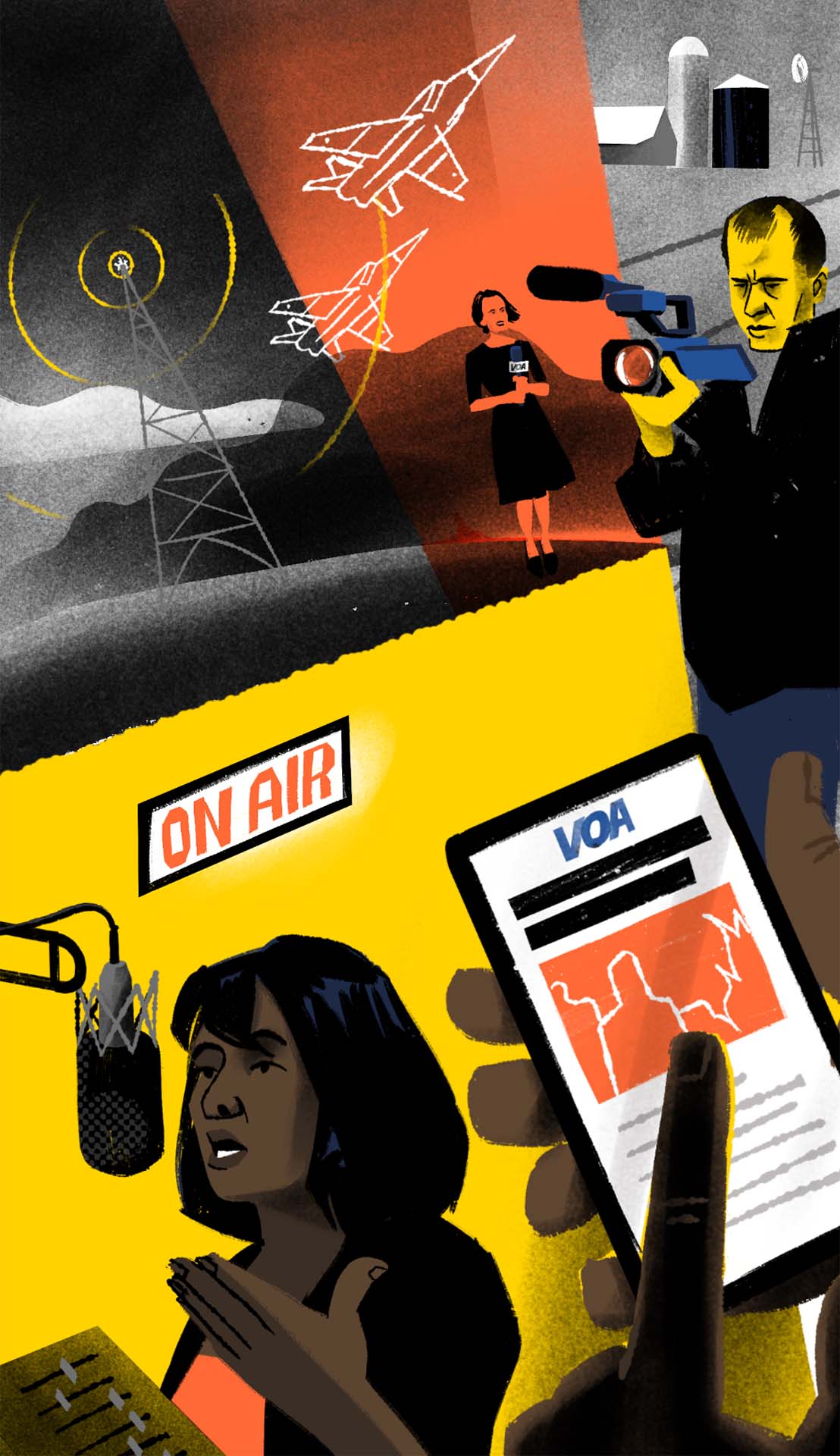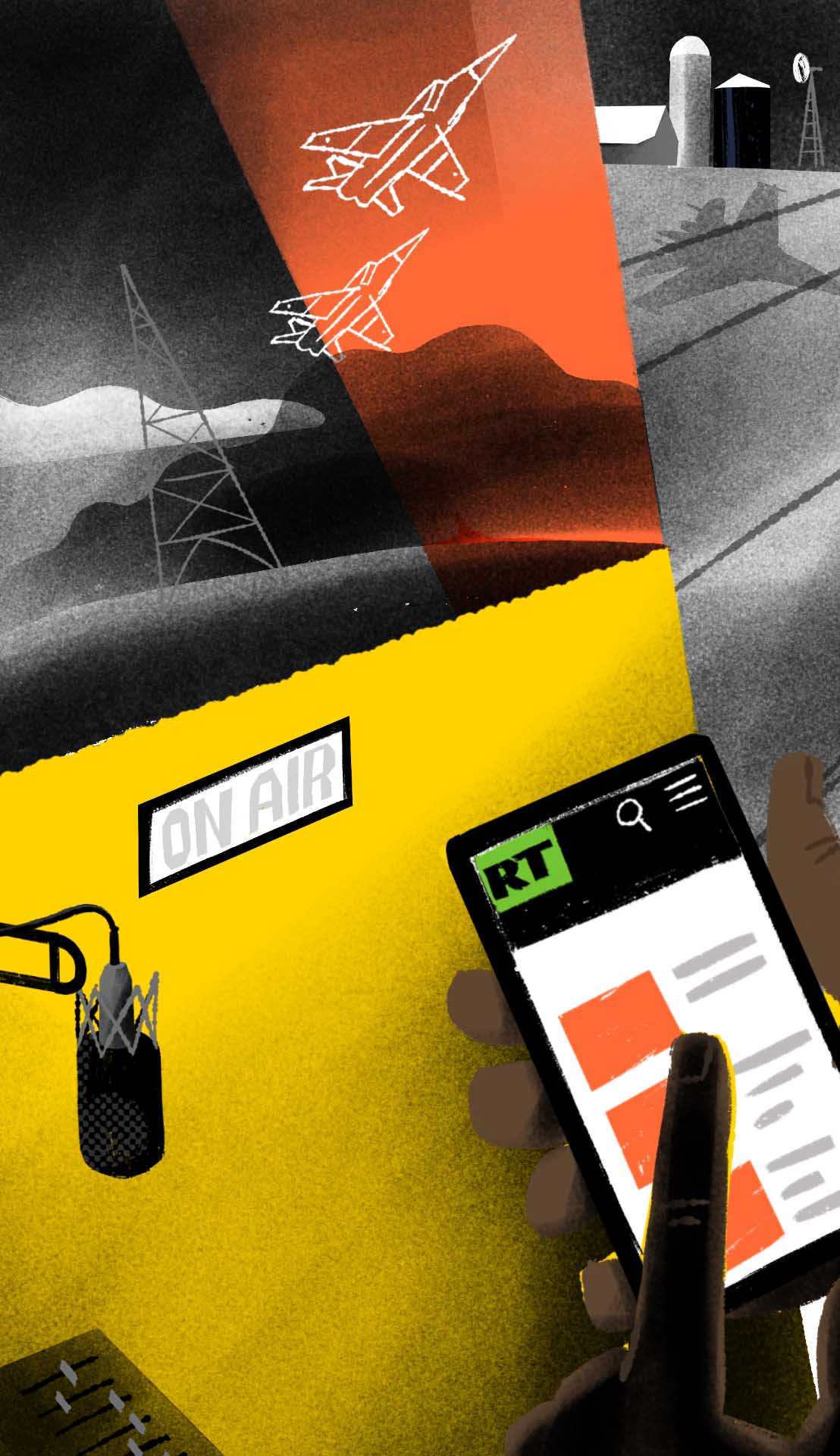Press Freedom
In authoritarian countries, the silencing of VOA is deafening
For 83 years, VOA has been a beacon of truth for those who need it most. But in a time of crisis and disinformation, its audience is cut off.


Press Freedom
In authoritarian countries, the silencing of VOA is deafening
For 83 years, VOA has been a beacon of truth for those who need it most. But in a time of crisis and disinformation, its audience is cut off.
Updated December 2, 2025 at 11:40 p.m.
A free press matters. It’s more than just a tagline at Voice of America. VOA broadcasts to some of the most censored countries in the world, and its journalists know firsthand the impact that credible, independent news can have.
From its first broadcast to counter Nazi propaganda 83 years ago to March 15, 2025, VOA has sought to be a beacon of truth for people living in countries where a free press is in short supply. VOA journalists broadcast vital information during conflicts and times of crisis and provide an in-depth look at America’s policies, culture and history.
But in March 2025, President Donald Trump signed an executive order effectively silencing VOA. In doing so, the leader of the free world succeeded in doing what authoritarian leaders had tried to do for decades: silence VOA.
Underscoring how repressive regimes view the closure as a win, the Russian British, political activist and journalist Vladimir Kara-Murza, who spent more than two years in a Russian prison, tweeted: “One more champagne bottle opened in the Kremlin.”
VOA exports the American ideals of press freedom and democracy around the globe. What made it unique is its ability to deliver the news in local languages and with a mission driven not by commercial success but by deeply held values in telling America’s story through independent and objective reporting.
| RSF index | Country | USAGM weekly audience | |
|---|---|---|---|
| 180 | Eritrea* | — | |
| 179 | North Korea* | — | |
| 178 | China* | — | |
| 177 | Syria* | — | |
| 176 | Iran | 19.0% | |
| 175 | Afghanistan | 65.7% | |
| 174 | Turkmenistan* | — | |
| 173 | Vietnam | 6.4% | |
| 172 | Nicaragua | 59.1% | |
| 171 | Russia | 8.7% | |
| 170 | Egypt | 13.4% | |
| 169 | Myanmar | 26.8% | |
| 168 | Djibouti* | — | |
| 167 | Azerbaijan | 5.7% | |
| 166 | Belarus | 10.7% | |
| 165 | Cuba | 4.1% | |
| 164 | United Arab Emirates | 15.5% | |
| 163 | Palestinian Territories | 13.5% | |
| 162 | Saudi Arabia | 12.5% | |
| 161 | Cambodia | 13.6% | |
| 160 | Venezuela | 15.3% | |
| 159 | Turkey | 5.0% | |
| 158 | Pakistan | 5.7% | |
| 157 | Bahrain | 18.4% | |
| 156 | Sudan | 6.5% | |
| 155 | Iraq | 33.8% | |
| 154 | Yemen | 13.3% | |
| 153 | Tajikistan | 18.3% | |
| 152 | Bhutan | ||
| 151 | India | 3.2% | |
| 150 | Laos | 4.3% | |
| 149 | Bangladesh | 3.7% | |
| 148 | Uzbekistan | 10.6% | |
| 147 | Jordan | 13.1% | |
| 146 | Rwanda | 19.8% | |
| 145 | Ethiopia | 4.8% | |
| 144 | Kyrgyzstan | 37.6% | |
| 143 | Uganda | 6.5% | |
| 142 | Honduras | 24.7% | |
| 141 | Kazakhstan | 9.4% | |
| 140 | Hong Kong | 6.7% | |
| 139 | Sri Lanka | 1.7% | |
| 138 | Guatemala | 39.2% | |
| 137 | Libya | 23.5% | |
| 136 | Somalia | 61.9% | |
| 135 | El Salvador | 48.9% | |
| 134 | Oman* | — | |
| 133 | DR Congo | 16.2% | |
| 132 | Lebanon | 17.4% | |
| 131 | Cameroon | 18.2% | |
| 130 | Peru | 48.6% | |
| 129 | Tunisia | 7.6% | |
| 128 | Kuwait* | — | |
| 127 | Indonesia | 32.9% | |
| 126 | Algeria | 6.4% | |
| 125 | Burundi* | — | |
| 124 | Mexico | 38.4% | |
| 123 | Singapore | 6.8% | |
| 122 | Nigeria | 33.2% | |
| 121 | Togo | 3.1% | |
| 120 | Morocco | 10.8% | |
| 119 | Mali | 35.1% | |
| 118 | Equatorial Guinea* | — | |
| 117 | Kenya | 18.8% | |
| 116 | Philippines | 6.6% | |
| 115 | Colombia | 21.5% | |
| 114 | Georgia | 19.7% | |
| 113 | Madagascar | 3.2% | |
| 112 | Israel | 9.2% | |
| 111 | Haiti* | — | |
| 110 | Guinea-Bissau* | — | |
| 109 | South Sudan* | — | |
| 108 | Chad | 11.7% | |
| 107 | Lesotho* | — | |
| 106 | Zimbabwe | 7.4% | |
| 105 | Burkina Faso | 2.8% | |
| 104 | Maldives | ||
| 103 | Guinea | 7.2% | |
| 102 | Mongolia | 1.5% | |
| 101 | Mozambique | 3.6% | |
| 100 | Angola | 9.4% | |
| 99 | Kosovo | 34.7% | |
| 98 | Eswatini* | — | |
| 97 | Brunei | ||
| 96 | Serbia | 24.9% | |
| 95 | Tanzania | 19.2% | |
| 94 | Ecuador | 40.7% | |
| 93 | Bolivia | 46.9% | |
| 92 | Benin | 2.5% | |
| 91 | Northern Cyprus* | — | |
| 90 | Nepal | 1.9% | |
| 89 | Greece | ||
| 88 | Malaysia | 3.1% | |
| 87 | Argentina | 24.2% | |
| 86 | Bosnia | 23.6% | |
| 85 | Thailand | 7.3% | |
| 84 | Paraguay | 40.0% | |
| 83 | Niger | 45.8% | |
| 82 | Zambia | 5.7% | |
| 81 | Botswana | 4.2% | |
| 80 | Albania | 32.0% | |
| 79 | Qatar* | — | |
| 78 | Papua New Guinea | ||
| 77 | Cyprus | ||
| 76 | Malawi | 5.0% | |
| 75 | Comoros | ||
| 74 | Senegal | 1.6% | |
| 73 | Guyana | ||
| 72 | Central African Republic* | — | |
| 71 | Republic of Congo | 13.4% | |
| 70 | Bulgaria | 8.3% | |
| 69 | Chile | 4.9% | |
| 68 | Hungary | 3.2% | |
| 67 | Malta | ||
| 66 | Japan | ||
| 65 | Andorra | ||
| 64 | Ivory Coast | 4.6% | |
| 63 | Brazil | 1.0% | |
| 62 | Ukraine | 33.3% | |
| 61 | South Korea | 3.4% | |
| 60 | Croatia | ||
| 59 | Uruguay | 41.8% | |
| 58 | Gambia | 3.3% | |
| 57 | United States | ||
| 56 | Sierra Leone* | — | |
| 55 | Romania | 6.1% | |
| 54 | Liberia | 10.0% | |
| 53 | Panama | 23.7% | |
| 52 | Ghana | 30.4% | |
| 51 | Mauritius* | — | |
| 50 | Mauritania* | — | |
| 49 | Italy | ||
| 47 | Belize | ||
| 46 | Tonga | ||
| 45 | Seychelles* | — | |
| 44 | Samoa | ||
| 43 | Dominican Republic | 50.5% | |
| 42 | North Macedonia | 18.1% | |
| 41 | Gabon | 3.5% | |
| 40 | Fiji | ||
| 39 | East Timor | ||
| 38 | Slovakia | ||
| 37 | Montenegro | 17.8% | |
| 36 | Costa Rica | 54.5% | |
| 35 | Moldova | 32.2% | |
| 34 | Armenia | 44.5% | |
| 33 | Slovenia | ||
| 32 | Suriname | ||
| 31 | Poland | ||
| 30 | Cabo Verde | ||
| 29 | Australia | ||
| 28 | Namibia | 23.9% | |
| 27 | South Africa | 5.9% | |
| 26 | Jamaica | ||
| 25 | France | ||
| 24 | Taiwan | 7.8% | |
| 23 | Spain | ||
| 22 | Austria | ||
| 21 | Canada | ||
| 20 | United Kingdom | ||
| 19 | Trinidad and Tobago | ||
| 18 | Belgium | ||
| 17 | Iceland | ||
| 16 | New Zealand | ||
| 15 | Latvia | 14.6% | |
| 14 | Lithuania | 26.0% | |
| 13 | Luxembourg | ||
| 12 | Liechtenstein | ||
| 11 | Germany | ||
| 10 | Czechia | ||
| 9 | Switzerland | ||
| 8 | Portugal | ||
| 7 | Ireland | ||
| 6 | Denmark | ||
| 5 | Finland | ||
| 4 | Sweden | ||
| 3 | Netherlands | ||
| 2 | Estonia | 23.2% | |
| 1 | Norway | ||
* USAGM is unable to gather audience survey data in some countries because of restrictions, political interference or military conflict.
Source: RSF and USAGM
Press freedom according to RSF
Click on a country to see a profile of the press freedom situation.
Jailed journalists
Sources: CPJ and RSF
Their commitment to a free press is why one aspect of the lawsuit VOA journalists filed against the Trump administration centers on the First Amendment. The media watchdog Reporters Without Borders, known as RSF, has joined VOA in this lawsuit.
Noting that VOA is among the most reliable – and sometimes the only – sources of independent news, RSF USA Executive Director Clayton Weimers said in a statement:
“Authoritarian censorship regimes, like the Kremlin and the Chinese Communist Party, are loudly cheering for the death of Voice of America. It’s clear that Donald Trump’s action will encourage harsher crackdowns against journalists and press freedom, putting VOA and RSF staff, correspondents, volunteers, and supporters in greater danger. RSF is compelled to act to protect VOA and the broader press freedom community.”
Press freedom and civil liberties globally are in decline, and the rise of disinformation, including AI deepfakes, comes amid growing distrust in traditional media.
VOA, through its mandate to provide objective, accurate and authoritative news, and to broadcast a range of viewpoints and opinion on U.S. policy, had been an effective antidote in the age of disinformation.
When Myanmar’s military launched a coup in February 2021, protesters held signs in the street that read: “VOA — we trust. BBC — we trust. RFA — we trust.”
VOA’s journalists, many of whom have lived under authoritarian rule, know that their audiences count on that reporting.

Among them is Patsy Widakuswara, VOA White House bureau chief and lead plaintiff in the lawsuit to restore the broadcaster.
Born in Jakarta, Widakuswara was part of the 1998 student-led movement that ended Indonesian President Suharto’s more than 30-year rule. Working as a radio host, she helped to mobilize support for the protests, until she was taken off the air. Widakuswara later worked for American media outlets as they covered Indonesia’s “Reformasi” movement.
“Until I started working for American media outlets, I didn’t know what freedom of the press looked like because I had never seen it,” Widakuswara says. “I never imagined 27 years later I would be taking the U.S. government to court to defend it.”
East and Southeast Asia
The news divisions covering this region provide factual reporting and analysis related to audiences including in China, Vietnam, South Korea, North Korea, Indonesia, Cambodia, Taiwan and Tibet.
Countries in the East Asia Pacific region regularly are listed among the least free globally. In the annual Press Freedom Index compiled by Reporters Without Borders, North Korea, China and Vietnam are among the 10 countries with the worst rankings for media freedoms. RSF has documented what it describes as a regional crackdown “increasingly inspired by the Chinese method of controlling information.”
Despite the limits on free expression, VOA’s Mandarin service has broken through to provide independent and fact-based news. Its journalists’ success is seen in the constant attacks by Chinese officials and state media. Here’s one of several examples: At the Chinese Foreign Ministry’s year-end press conference in December 2021, a ministry spokesperson, Zhao Lijian, gave a lengthy prepared speech accusing VOA of “working with the U.S. government” to “contain and suppress China.” He accused VOA’s coverage of politicizing issues such as human rights, U.S.-China relations, COVID-19 pandemic measures and the 2022 Beijing Games. The comments came after VOA Mandarin released reports reviewing China’s influence on Hong Kong law and about human rights in Xinjiang in 2021.
Beijing’s flagship media outlet, The Global Times, reacted to VOA’s sudden suspension in March 2025 with an editorial headlined: “Why VOA, known as a ‘lie factory,’ has halted operations.”
The editorial tries to frame the factual news coverage by VOA and VOA Mandarin of key international issues as an attempt to attack China. “From smearing human rights in China’s Xinjiang to hyping up disputes in the South China Sea, from supporting ‘Taiwan independence’ forces to backing Hong Kong rioters, from fabricating the so-called China virus narrative to promoting the claim of China’s ‘overcapacity,’ almost every malicious falsehood about China has VOA’s fingerprints all over it,” the editorial says.
What it leaves out is that VOA journalists adhere to strict editorial guidelines and journalism best practices to ensure their content is independent, verified and accurate. Their coverage on China provides uncensored truth to millions who are cut off from independent news.
Governments in many of the countries VOA broadcasts to in the East Asia Pacific region keep a tight grip on the information space, using threats, laws and arrests to ensure media comply with censorship directives. It is in those places that VOA has some of its strongest audience support.
Using technology and new formats, VOA strives to reach audiences that are closed off from independent information. Until VOA was silenced in March 2025, its broadcasts even reached parts of North Korea, where citizens risk prison just to access foreign media.
Part of VOA Korean’s coverage told America’s story, including through a series that profiled all 50 states, and a video series about life in the U.S.
And an agreement with the South Korean government in 2023 allowed VOA to make use of state-controlled broadcast towers along South Korea’s border with the North. Until March 15, VOA broadcast a 25-minute show four times a week into one of the most censored countries in the world. The show, “Washington Talk,” gave audiences access to U.S. foreign policy and political officials.
Martyn Williams, of the Stimson Center’s 38 North project, told media freedom expert Joel Simon that while the audience was not large, the content still had reach. “A lot of information travels by word of mouth, so you don’t necessarily need a large audience to spread what’s happening in the world,” Williams said in a June 2025 article in Columbia Journalism Review.
Eurasia
Russia’s full-scale invasion of Ukraine, Alexander Lukashenko’s crackdown on civil society and free speech in Belarus, media suppression in Georgia, and illiberal democracies and downward trends in other countries are exacerbating a media scene already under economic pressure. Russian propaganda and Moscow’s targeting of critics who fled into exile add to the risks and pressures.
But in this harsh media environment, audiences returned time and again to their long-trusted source of news: VOA. Before the broadcasts were silenced, more than 90% of VOA’s Albanian and Ukrainian audience trusted the content, based on surveys. VOA also had high-trust figures in more adversarial markets, including in Russia. The commitment to truth and accuracy has translated into audience loyalty in the region. VOA’s news reporting also filled an important gap in the local media markets, where few countries have their own journalists assigned to cover the United States. Because of that, VOA content provided a window on American life, thought and institutions, and dozens of media outlets, including national broadcasters, carried the reporting.
America has long played a vital role in promoting democracy in this region, and VOA’s interviews with lawmakers, officials and newsmakers often drove local news agendas. By carrying livestreams of major events and speeches by U.S. officials, audiences were able to judge developments for themselves. In many ways, VOA offered a reality check on the propaganda pushed by authoritarian governments in the region.
Investigative reporting by VOA also translated into real-world impact. Coverage in Albanian, for instance, resulted in a debate in that country’s parliament. And in the weeks before Trump ordered the dismantling of USAGM, VOA’s Russian and Ukrainian newscasts attracted millions of viewers who tuned in to watch live appearances of the president, from his inaugural speech to his address to a joint session of Congress.
South and Central Asia
This region appears deep red on the RSF World Press Freedom Index map, the color denoting countries with some of the most repressive policies and restrictive environments for journalists. Among those countries are Afghanistan, Pakistan and Azerbaijan. Polarization, violence and impunity in attacks against journalists, and authoritarian regimes imposing strict edicts have left little space for independent journalism. Elsewhere, as in India, a polarized political scene and regular attacks on journalists make reporting on key issues risky. Afghanistan, which had been developing a thriving media scene, has seen its journalism severely curtailed since the return of Taliban rule. With local media shuttering and women cut off from education and society, VOA’s Dari and Pashto broadcasts were providing a vital lifeline.
To counter the censorship, VOA launched a 24/7 satellite TV channel for Afghanistan and boosted medium and shortwave radio. As women inside Afghanistan were being removed from society, VOA ensured its female hosts and reporters still appeared on air, and created special programming on women’s rights. A daily radio call-in show allowed ordinary Afghans to voice their opinions on changes in the country.
The Taliban tried to block VOA’s websites, but anti-censorship technology on VOA’s app and social media platforms ensured content still reached audiences. Recent telephone surveys showed that more than 50% of Afghans with cellphones consumed VOA content and more than 90% trusted it.
In Pakistan, the government also tried to block Urdu and Deewa websites because of their coverage of issues that officials censor in local media. That access to independent and uncensored news is why VOA had tens of millions of followers and views on social media.
As of August 2025, the Afghan service puts out minimal content each week.
Africa
With Eritrea named the most repressive country for media, and seven African countries ranked near the bottom of the RSF index, media watchdogs are raising the alarm about declining freedoms. But throughout coups and crises, VOA’s Africa division has been there providing factual, objective news. Broadcasting in nearly 20 languages, including Amharic, Bambara, French, Kinyarwanda, Lingala, Portuguese, Somali, and Swahili, journalists at VOA provide a lifeline.
With Uganda, Rwanda and Ethiopia ranked in the “very serious” category in the 2025 index, VOA had provided clear and objective news. As unrest in the Sahel region made coverage increasingly risky, VOA journalists made sure news still flowed. Authorities in Burundi had officially banned VOA, but audiences still found the broadcasts via smartphones, so they could access information being censored in their own country.
“There were WhatsApp groups for sharing certain programmes in Kirundi or Kinyarwanda. The suspension of VOA deprives part of the political class and other key players of a space for free expression,” one Burundian journalist told RSF. In Niger, where VOA previously reached 46% of adults weekly, “listeners have been left confused, dependent on rumours circulating on social media and WhatsApp groups,” a community radio journalist told RSF. The media watchdog is a plaintiff in the lawsuit seeking to restore VOA broadcasts.
VOA’s Africa division used dynamic broadcasts to reach audiences, from multilanguage studio events with diaspora voters during the elections, coverage on U.S. trade and investment, and reporting on the Basketball Africa League/NBA Partnership, the journalists sought to provide relevant information and tell America’s story to those living across Africa.
Latin America
Lawsuits, censorship, harassment, and authoritarian rule are among the factors that have severely impacted independent media and journalist safety in countries including Nicaragua, Venezuela and Cuba.
Under the Ortega administration in Nicaragua, authorities have revoked the citizenship of journalists and critics, and the crackdown has forced many media outlets into exile. This year, the country ranks as the worst in the region for press freedom, beating Cuba.
Censorship and legal harassment of journalists in Venezuela is another low point for the region. Venezuela’s independent media had strong links and affiliate partnerships with VOA’s Spanish language broadcasts, which relayed vital U.S. and regional news and policy to audiences who, without the broadcasts, are left in the dark.
Similarly, in Haiti, where instability and gang violence have brought the country into crisis, VOA’s Creole service was able to provide vital, life-saving information to those who need it most.
Until March 15, 2025, VOA’s Spanish-language content reached a weekly audience of 100.7 million.
VOA Spanish has been at the front lines of breaking news, bringing in-depth analysis and coverage on a range of issues. In 2024, it broadcast a special elections series, with its reporters traveling to several U.S. states, interviewing voters to understand their interests and sharing updates on their journey to places including New Hampshire, Tennessee and Massachusetts.
The Spanish language newsroom is also a leader in coverage of migration issues: Multimedia projects like “In the Steps of the Coyote,” delve into illegal migrant trafficking at the U.S.-Mexico border. The content includes firsthand testimonies, such as from a cartel member turned undercover informant, revealing the inner workings of the human trafficking business. This comprehensive coverage, including podcasts and multimedia specials that provide factual coverage and humanize the migrant experience, offers a balanced view of the crisis.
When the broadcasts were cut off without warning, several affiliate networks expressed concern, citing how important VOA’s objective journalism is to their audiences, including informing the public about U.S. and foreign policy, Russia’s invasion of Ukraine, the Israel-Hamas war, immigration and drug trafficking.
From Venezuela, one network described VOA as an “essential source of news,” citing the network’s “extensive international coverage [that] spans politics, economics, technology, and social issues,” and its “crucial” reporting on the presidential election. A station in Colombia described VOA’s Spanish broadcasts as “vital for promoting a culture of peace,” and sharing information at a time when disinformation and fake news are spreading.
Jailed journalists
Journalism can be a dangerous profession. More than 20 journalists who worked for VOA and its sister networks have been killed in their pursuit of truth. And as of December 2025, nine journalists and contributors are imprisoned by hostile countries.

Vietnam has been detaining reporter and blogger Pham Chi Dung, who contributed to VOA, since November 2019. A court in 2021 sentenced the journalist to 15 years in prison, followed by three years’ house arrest for spreading what Vietnam considers anti-state propaganda. Pham Chi Dung is a free press advocate. Alongside his work for VOA, he helped found the Independent Journalists Association of Vietnam, which pressed for greater media rights in Vietnam. The United Nations working group on arbitrary detention in 2024 found that Pham Chi Dung’s detention “lacks a legal basis” and that his arrest is the result of him exercising his right to freedom of expression. The journalist’s family has told the Committee to Protect Journalists that prison authorities denied Pham Chi Dung medical treatment.
Four journalists at VOA sister network Radio Free Asia are also jailed in Vietnam and serving lengthy sentences: Nguyen Vu Binh is serving seven years; Nguyen Lan Thang is serving six years; Nguyen Tuong Thuy is serving 11 years; and Truong Duy Nhat is serving 10 years.

Myanmar’s junta arrested VOA Burmese contributor Sithu Aung Myint in August 2021 during a period of mass arrests of reporters after the February 2021 coup. He spent more than four years in custody in Myanmar before being freed as part of an amnesty in late 2025. Myanmar continues to detain Shin Daewe, a documentary filmmaker who contributed to Radio Free Asia.

Less than two months after VOA broadcasts were silenced, Azerbaijan detained VOA contributor Ulviyya Guliyeva. Fearing arrest, the journalist left a note to be published in the event of her detention. In it, she said, “If you are reading this note it is because I have been unjustly jailed for my journalism work. Like my other journalist colleagues, I have committed no crime.”
Guliyeva, who reported for VOA’s Azerbaijani service, had been called in for police questioning in January and placed under a travel ban. Earlier in May, police searched her home. Her arrest appears linked to a wider pattern of detentions of journalists linked to Meydan TV. Authorities allege that Guliyeva conspired with Meydan TV journalists in a currency smuggling operation, charges that all those arrested have denied. While in custody, authorities beat Guliyeva, including striking her head and threatening her with sexual violence. Her family has said that the journalist was vomiting repeatedly after the interrogation and had requested medical assistance.

Azerbaijan is also detaining a contributor to Radio Free Europe/Radio Liberty. The economist and journalist Farid Mehralizada was sentenced in June to nine years in prison. In response, U.S. Senator Jeanne Shaheen on the Senate Foreign Relations Committee, called the Baku court ruling “a travesty of justice.”
RFE/RL is advocating for the release of Mehralizada and also Nika Novak, imprisoned in Russia since December 2023. Its contributor, Ihar Losik, was freed in mid-September after five years in a Belarus prison, thanks to diplomatic efforts by U.S. and Lithuanian officials.
The loss of VOA around the world
VOA reached a global weekly audience of more than 360 million and worked as an effective form of U.S. soft power for more than eight decades. Former veteran VOA correspondent Steve Herman says that VOA annually costs less than two new fighter jets and gives the American taxpayer better value for the money in terms of soft power.
The sudden silencing of VOA broadcasts caused alarm in several regional State Department offices. In cables, as detailed in a declaration to the court, officials explained the damaging effects of losing VOA broadcasts.
One cable warns that the “Post has lost its most potent interagency partner in the fight against Chinese media influence in Botswana.”
Another cable, this one from Kosovo, warned that the void left will be filled by propaganda from Russia, China and others, “undermining U.S. influence and policy.”
From Nigeria, a cable warned, “China may capitalize on the USAGM retreat to expand its soft power reach in Nigeria, while Russia’s influence, which has waned, may be revitalized in the absence of USAGM from Nigeria.”
And another stated that the ending of broadcasts creates a “critical news and information gap” along the Afghanistan-Pakistan border and will allow for “military, jihadist, and extremist narratives and disinformation [to] dominate the media landscape.”
VOA’s mission throughout its 83-year legacy has been to provide accurate, authoritative and reliable news to audiences who lack access to a free press. By telling America’s story through journalism, the U.S. was able to show how democracy works. Broadcasting America’s voice and viewpoints to the world costs the average taxpayer roughly $2.25 a year, but the returns – as 83 years of journalism has proved – are immeasurable.
